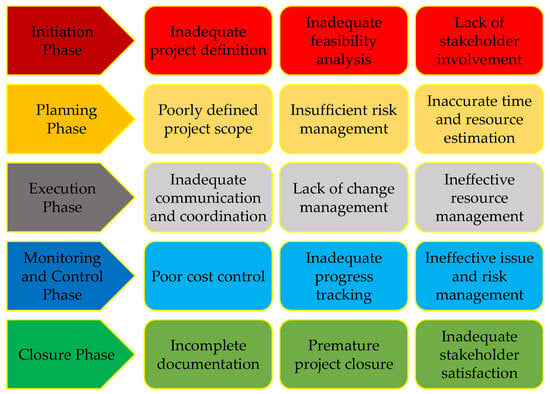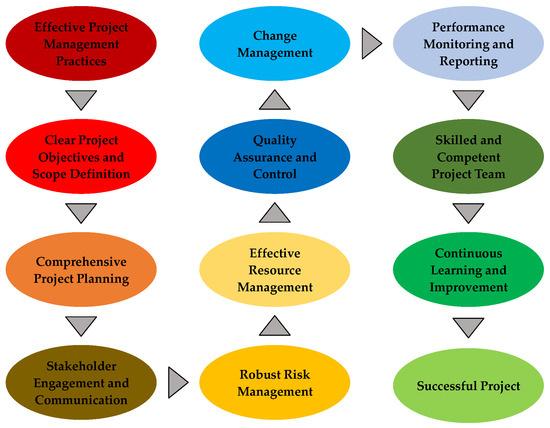Abstract
Effective project management practices are crucial in the construction sector, providing a structured approach to planning, executing, and controlling projects. They set clear objectives, define scopes, allocate resources efficiently, and manage risks effectively. However, challenges can arise throughout all project phases. This study focuses on literature from reputable journals over the last decade, and, considering the post-COVID scenario for inadequate scope definition, poor communication, resource mismanagement, and regulatory barriers were identified as major barriers to project success. To achieve sustainable construction projects, specific targets like energy efficiency, waste reduction, water conservation, and social responsibility must be set. Integrating project management with sustainability involves incorporating green building design, sustainable materials, waste management, water conservation, biodiversity promotion, smart technologies, and performance measurement systems. By adopting sustainable approaches and effective project management practices, construction projects can achieve successful outcomes while ensuring environmental responsibility, social equity, and economic viability. Future research should explore identified barriers, their local implications, and project management practices for successful project outcomes.
1. Introduction
Effective communication is crucial for project success, managing triple constraints, and sustainable practices. This involves environmental responsibility, social equity, and economic viability [1]. Project management methods control construction costs through precise estimation and cost control. Engaging stakeholders with effective communication ensure project success and quality assurance [2]. Proactive planning, stakeholder engagement, risk management, and continuous monitoring mitigate cost overruns, improving project progress for timely completion with minimized costs.
Energy efficiency, Leadership in Energy and Environmental Design (LEED) certifications [3], greenhouse gas (GHG) emissions reduction targets [4], and waste management are vital for sustainability [1]. Water conservation aims for efficient water management [1]. Challenges in achieving sustainability objectives include inadequate leadership support, limited resources, poor planning, and competing goals, as well as insufficient collaboration, communication, monitoring, and evaluation, and inconsistent regulations and policies creating barriers and uncertainties in reaching goals.
To achieve effective project planning and execution, define clear objectives, scope, deliverables, and success criteria. A detailed project plan and efficient communication with stakeholders prevent misunderstandings [1]. Implement risk management to maintain timelines and budgets [2]. Optimize resource management and adhere to quality standards [2]. Employ a structured change management process to handle changes. Monitor progress using KPIs while embracing innovative technologies, best practices, and green building principles for enhanced outcomes [2].
In view of deficient integration, adopting sustainable approaches, and implementing effective project management practices, construction projects can achieve successful outcomes while ensuring environmental responsibility, social equity, and economic viability.
2. Project Management Practices in Construction Sector
2.1. Role of Project Management in Construction Sector
Project management practices are crucial for successful construction projects, encompassing aspects like time, budget, quality, and resources. They prevent cost overrun issues through goal setting, feasibility studies, and realistic schedules [5]. Risk assessment and cost-control measures ensure staying within the budget [2]. In conclusion, project management is pivotal, providing a structured approach for planning, controlling, and executing, leading to successful project delivery.
2.2. Issues Related to Project Management during Various Project Phases
Project management involves distinct project lifecycle phases and challenges, as shown in Figure 1. Unclear initiation objectives and scope lead to stakeholder misalignment [2]. Inadequate feasibility assessment causes unrealistic goals and resource shortages [2]. Planning scope creep increases costs and delays [1]. Underestimating project duration and resource needs results in conflicts [1]. Proactive planning, communication, stakeholder engagement, risk management, and continuous monitoring are crucial for project success.

Figure 1.
Issues related to project management during various project phases.
3. Sustainability in Construction Projects
3.1. Targets for Achieving Sustainability in Construction Projects
Achieving sustainability in construction requires specific targets for environmental, social, and economic responsibility. Table 1 lists common targets: energy efficiency to reduce consumption [6], (GHG) emissions reduction [4], waste management to minimize generation [1], water conservation [7], and sustainable materials use [8]. Realistic goals aligned with regulations, project type, and stakeholders’ priorities contribute to a responsible built environment.

Table 1.
Targets for achieving sustainability in construction projects.
3.2. Issues Leading to Failure of Sustainability Goals
Challenges in building projects for sustainability include limited knowledge, poor planning, resource constraints, and competing goals. Leadership support, budget constraints, and rapid construction also pose difficulties. Inadequate monitoring hampers progress tracking [2]. Limited awareness, sustainable technology availability, and resistance to change hinder adoption [2]. Holistic sustainability demands strong leadership, stakeholder engagement, planning, communication, and resource allocation.
4. Integration of Project Management Practices with Sustainability
4.1. Effective Project Management Practices for a Successful Project
Effective project management practices are vital for successful construction projects, as shown in Figure 2. Key practices include well-defined objectives, scope, and deliverables, as well as effective communication with stakeholders [2]. Quality standards and a structured change management process are essential for meeting project standards. Systematic monitoring and reporting using KPIs is necessary [2]. A capable and motivated project team fosters a positive team culture. Embracing innovative technologies and industry best practices enhances project success and stakeholder satisfaction [9].

Figure 2.
Effective project management practices to avoid cost overrun in construction projects.
4.2. Sustainable Approaches for a Successful Project
Table 2 shows achieving construction project sustainability through green building principles, using energy-efficient designs, sustainable materials, and renewable energy systems. Obtain certifications from recognized green building rating systems like LEED or other international standards [3]. Utilize water-efficient fixtures, rainwater harvesting, and greywater reuse [7]. Implement smart technologies like Building Management Systems (BMS) and IoT devices for energy efficiency and occupant comfort [9]. Set sustainability KPIs for energy, water, waste, and carbon emissions, regularly assessing and reporting progress for continuous improvement and transparency.

Table 2.
Sustainable approaches for successful construction project.
5. Conclusions
Project management ensures construction project success, aiding resource allocation, risk management, and communication. Integrating sustainability, green design, and smart technologies fosters environmental responsibility, social equity, and economic viability.
- Project management and sustainability practices enhance success, cost control, stakeholder satisfaction, and built environment.
- Sustainable construction projects aim for energy efficiency, waste reduction, water conservation, and social responsibility.
- The blend of project management and sustainability fosters success, cost control, stakeholder satisfaction, and a sustainably built environment.
6. Recommendations
The research explores existing knowledge regarding practical aspects in construction projects, including training, deployment, standardization, and implications. Utilize key tools like scheduling, risk strategizing, quantitative analysis, and earned value management. Future research should focus on critical variables, variations, and reasons, guiding sustainable construction projects through project management skillset implications.
Author Contributions
Conceptualization, S.A.; methodology, S.A. and O.S.B.; investigation, F.H.S.; data curation, F.H.S.; writing—original draft preparation, F.H.S.; writing—review and editing, S.A. and O.S.B.; supervision, S.A. and O.S.B. All authors have read and agreed to the published version of the manuscript.
Funding
This research received no external funding.
Institutional Review Board Statement
Not applicable.
Informed Consent Statement
Not applicable.
Data Availability Statement
Not applicable.
Acknowledgments
The authors would like to thank every person who supported in conducting this research through accessibility to the information and the review of the literature, published data, and reports.
Conflicts of Interest
The authors declare no conflict of interest.
References
- Borthakur, A.; Govind, M. Emerging trends in consumers’ E-waste disposal behaviour and awareness: A worldwide overview with special focus on India. Resour. Conserv. Recycl. 2017, 117, 102–113. [Google Scholar] [CrossRef]
- Lin, L.; Xu, F.; Ge, X.; Li, Y. Improving the sustainability of organic waste management practices in the food-energy-water nexus: A comparative review of anaerobic digestion and composting. Renew. Sustain. Energy Rev. 2018, 89, 151–167. [Google Scholar] [CrossRef]
- Zhang, Y.; Wang, H.; Gao, W.; Wang, F.; Zhou, N.; Kammen, D.M.; Ying, X. A survey of the status and challenges of green building development in various countries. Sustainability 2019, 11, 5385. [Google Scholar] [CrossRef]
- Mac Kinnon, M.A.; Brouwer, J.; Samuelsen, S. The role of natural gas and its infrastructure in mitigating greenhouse gas emissions, improving regional air quality, and renewable resource integration. Prog. Energy Combust. Sci. 2018, 64, 62–92. [Google Scholar] [CrossRef]
- Govindaras, B.; Wern, T.S.; Kaur, S.; Haslin, I.A.; Ramasamy, R.K. Sustainable Environment to Prevent Burnout and Attrition in Project Management. Sustainability 2023, 15, 2364. [Google Scholar] [CrossRef]
- Amiri, A.; Ottelin, J.; Sorvari, J. Are LEED-certified buildings energy-efficient in practice? Sustainability 2019, 11, 1672. [Google Scholar] [CrossRef]
- Mugagga, F.; Nabaasa, B.B. The centrality of water resources to the realization of Sustainable Development Goals (SDG). A review of potentials and constraints on the African continent. Int. Soil Water Conserv. Res. 2016, 4, 215–223. [Google Scholar] [CrossRef]
- Yaro, N.S.A.; Sutanto, M.H.; Baloo, L.; Habib, N.Z.; Usman, A.; Yousafzai, A.K.; Ahmad, A.; Birniwa, A.H.; Jagaba, A.H.; Noor, A. A Comprehensive Overview of the Utilization of Recycled Waste Materials and Technologies in Asphalt Pavements: Towards Environmental and Sustainable Low-Carbon Roads. Processes 2023, 11, 2095. [Google Scholar] [CrossRef]
- Nižetić, S.; Djilali, N.; Papadopoulos, A.; Rodrigues, J.J. Smart technologies for promotion of energy efficiency, utilization of sustainable resources and waste management. J. Clean. Prod. 2019, 231, 565–591. [Google Scholar] [CrossRef]
- Sundara Rajoo, K.; Karam, D.S.; Abdu, A.; Rosli, Z.; James Gerusu, G. Urban forest research in Malaysia: A systematic review. Forests 2021, 12, 903. [Google Scholar] [CrossRef]
Disclaimer/Publisher’s Note: The statements, opinions and data contained in all publications are solely those of the individual author(s) and contributor(s) and not of MDPI and/or the editor(s). MDPI and/or the editor(s) disclaim responsibility for any injury to people or property resulting from any ideas, methods, instructions or products referred to in the content. |
© 2023 by the authors. Licensee MDPI, Basel, Switzerland. This article is an open access article distributed under the terms and conditions of the Creative Commons Attribution (CC BY) license (https://creativecommons.org/licenses/by/4.0/).